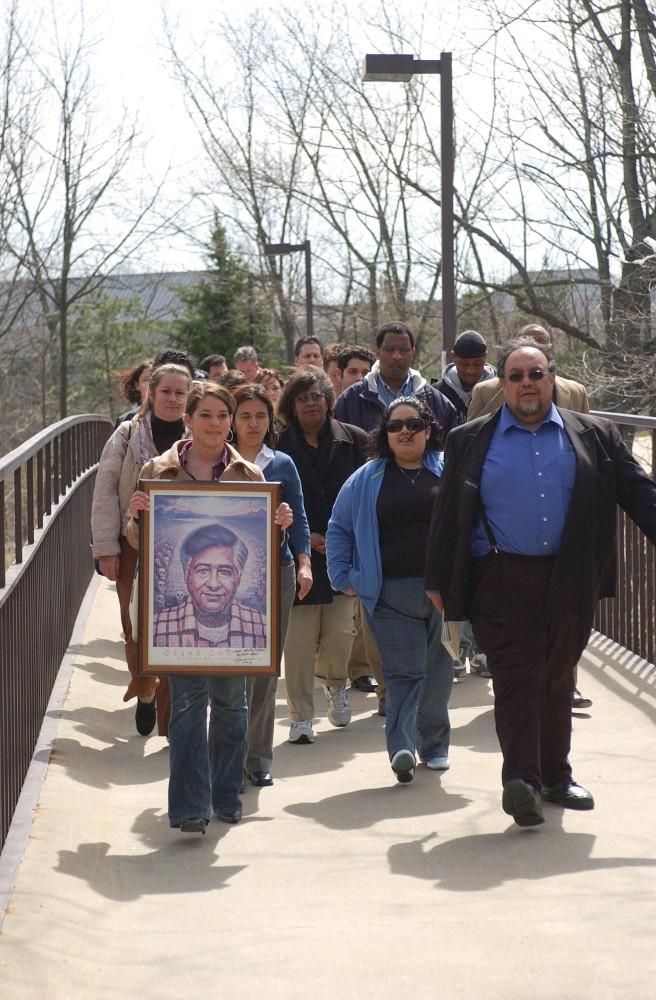Celebration to remind GV ‘sí se puede!’

GVL Archiev / Kyle A. Hudecz Students and faculty march in silence during a past Cesar Chavez celebration on the GVSU campus
Mar 27, 2011
Grape pesticides were causing birth defects, sterility, still births, miscarriages and cancer, and Cesar Chavez had something to say about it.
A silent march in honor of Cesar Chavez will begin at noon on Thursday at the entrance to Zumberge Library. Participants will walk in silence as they reflect on how the life of Chavez influenced the rest of history.
“It shows students’ solidarity in terms of community – the idea of marching together, hand-in-hand,” said Danny Ha, organizer for the Cesar Chavez Celebration and program coordinator for the Office of Multicultural Affairs. “We show a united front. We’re not going to back down, but we’re not going to use a physical means to do it.”
A lecture will take place following the silent march, starting at about 1 p.m., in the Grand River Room of Kirkhof Center.
Juan R. Buriel, associate professor of English at the College of Canyons in Valencia, Calif., will give a presentation, “What Do We Do With This History Now?” Buriel will discuss how Chavez’s spirit of non-violence propelled the civil rights and labor movements.
“He will teach students the method to question and use nonviolent tactics to make change and fight for equality,” Ha said.
A reception will follow the keynote address.
Ultimately, Ha wants students to walk home with one main message from the Cesar E. Chavez Celebration.
“No matter what age, you can make an impact on your fellow peers,” he said. “The only obstacles in the way are people’s own excuses.”
However, many students do not know about the life and work of Chavez simply because he lived during the previous generation, Ha said.
“They didn’t get to see him directly,” he said. “It’s more typical to connect with leaders of the time, and it’s more difficult to connect with leaders of the past. But it’s important to know that leaders of the past have made impacts that we are benefitting from today.”
Ha said students want to know more, they just need the resources, which will be available through the Cesar E. Chavez Celebration. For example, the keynote address will show students the history Chavez has created, then ask how they can carry on his legacy.
Cesar Chavez’s life for the social cause began when he met Fred Ross, who recruited Chavez to the Community Service Organization. The two formed 22 CSOs throughout California to help Latinos obtain citizenship and register to vote. In 1962, he formed the National Farm Workers Association, and in 1965, he helped start the five-year Delano Grape Strike.
The following year, Chavez and a small group of strikers marched to Sacramento, where they reached an agreement with the growers – the first union contract between growers and farm workers in U.S. history.
In 1968, Chavez rededicated the movement to nonviolence by fasting for 25 days, and Senator Robert F. Kennedy also participated.
“He was so insistent on using nonviolent tactics to fight for equal rights for everyone,” Ha said. “It’s important that GVSU joins in the same community fighting for equal rights in terms of race, religion, creed, color – everything that comes into play.”
However, when Chavez encouraged a boycott of lettuce in 1970, he was put in jail.
But in 1975, Gov. Jerry Brown of California passed the Agricultural Labor Relations Act, which allowed California farm workers to organize and bargain with their employers.
Chavez continued to fast and encourage boycotts of grapes, lettuce and other vegetables until his death on April 23, 1993.
Ha said Mahatma Gandhi and Dr. Martin Luther king Jr. inspired Cesar Chavez, and Chavez once gave a speech based on the lessons of King.
“Once social change begins, it cannot be reversed,” Chavez said in “Lessons of Dr. Martin Luther King, Jr.” “You cannot uneducate the person who has learned to read. You cannot humiliate the person who feels pride. And you cannot oppress the people who are not afraid anymore.
“In our life and death struggle for justice, we have turned to the court of last resort: the American people. And the people are ruling in our favor.”























